8 Ways to Give Your Cat the Immune Support They Need

While cats are often viewed as tough and independent, they actually need our help to live their best and healthiest lives. To tackle everything the world throws at them, they need a strong immune system - and that’s where we come in.
Why Cats Need Immune Support
Whether your cat is young or old, indoors or outdoors, a rescue or a purebred, they will need proper support from their human family to maintain a healthy immune system and live a healthy life.
Many cats are exposed to diseases like feline herpesvirus before they’ve even left their mother. This particular virus never leaves a cat once it’s infected, and it can cause disease flare-ups if the cat’s immune system weakens.
Other cats, especially those that grew up as strays, may contract FIV (feline immunodeficiency virus), which damages their immune system’s ability to fight infection. Others are simply prone to upper respiratory infections throughout their lives.
Even cats that are 100% healthy can experience health setbacks if there are stressful or anxiety-inducing events in their lives. And senior cats naturally become more susceptible to illness as they age.
This is why it’s so important that you provide your cat’s immune system with all the support it needs to keep your cat living a long, happy, and healthy life.
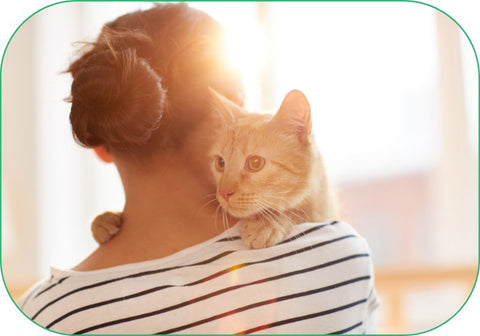
8 Ways to Support Your Cat’s Immune System
1. Keep Your Cat Indoors
The world outdoors can be dangerous - even lethal - for our cats. The average life expectancy of an outdoor cat is 2-5 years, whereas indoor cats may live for 15-17 years.
These dangers don’t just take the form of speeding cars or predators, either. Outdoor cats are exposed to more viruses and bacteria than indoor cats, which can lead to illness.
They could even contract FIV, the feline equivalent of AIDS. Once a cat has FIV, their immune system becomes compromised and far less effective. There is no cure for FIV, and cats with the disease must be kept indoors and away from other cats for the rest of their lives.
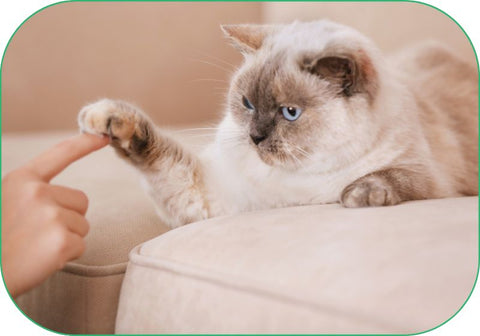
That doesn’t mean indoor cats are 100% protected from disease, though. Disease-causing germs can still sneak in on shoes, clothing, or even the family dog. That’s why our 2nd way to support their immune system is so important.
2. Visit Your Veterinarian Regularly
For adult cats, it’s recommended to visit the vet once a year. Senior cats should be seen a bit more often - once every six months.
During these visits, your vet will likely do an overall wellness check and give your cat any needed vaccinations. Vaccines - like those for rabies and feline leukemia - give your cat’s immune system vital defenses that could save their lives. In many states, rabies vaccines are also required by law.
Also, cats are notoriously good at hiding signs of pain and illness, so regular vet visits are a great way to spot potential problems early so you can give your cat the proper care.
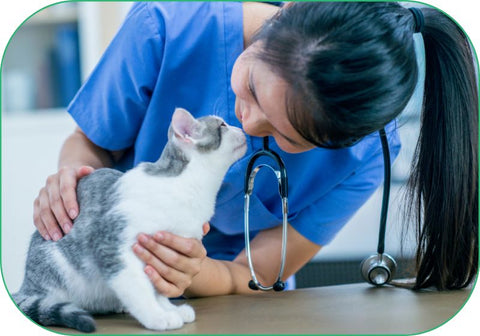
3. Reduce Their Stress
Just like in humans, constant stress can weaken your cat’s immune system. Signs of cat anxiety include constantly hiding, yowling, being aggressive, destroying things, or using the bathroom outside of the litter box.
If your cat is showing signs of anxiety, try to find the cause. Has your family’s daily routine changed? Is there a new family member in the home? Have there been any other major changes in their world?
Setting up a stable, regular routine for your cat can help. Providing them a safe space to call their own - like a cozy bed in a quiet corner of your home - can also give them the security they need to feel less stressed. And a stress-free cat is an immune-supported cat.

4. Keep Them at a Healthy Weight
When your cat wants some extra food or a between-meal treat, they can be incredibly persistent. And we want our cats to be happy, so a little extra food won’t hurt much, right?
Unfortunately, those extra treats and meals can add up to an overweight or obese cat. Obesity is the most commonly observed nutritional disorder in cats, seen in an estimated 40% of cats.
Obesity puts a terrible strain on our cats’ bodies. It affects multiple systems, including the cardiovascular and immune systems, and can lead to diabetes and osteoarthritis.
If you suspect your cat is overweight or obese, talk to your veterinarian. They can work with you to develop a plan to help your cat lose weight safely. And it’s likely that plan will include the next few items on this list.
Pin me!
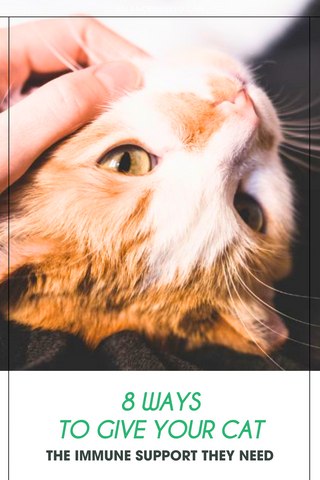
5. Give Them Regular Exercise
Unlike dogs, you don’t need to take your cats for walks every day (though some kitties enjoy it!). But they still need regular exercise to keep their blood circulating well and their immune system healthy.
Some cats can keep themselves entertained with a cat toy or two. Others may need a little one-on-one interaction with their favorite human to get into a playful exercise mood. Experiment with different toys and motions to see what your cat likes to chase best.
These sessions don’t have to be lengthy. Five to ten minutes a couple of times a day is enough for most cats.
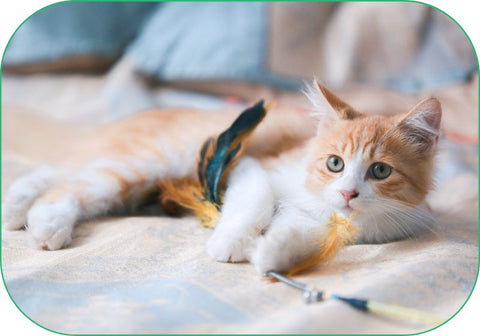
6. Feed Them a Balanced Diet
A healthy immune system needs healthy food to support it.
Make sure you’re giving your cat a diet that is balanced and complete. As obligate carnivores, cats need meat to survive. Unless otherwise recommended by your veterinarian, cat foods high in animal-based proteins are best.
Wet foods also have several advantages over dry foods. They often have lower levels of carbohydrates than dry food, which makes it easier for your cat to maintain a healthy weight. Wet foods also have more moisture, which is great for your cat’s hydration and overall health.
However, good cat food may not always be enough.

7. Provide Nutritional Support Through Natural Supplements
While most cat foods contain the minimum amount of nutrients most cats need, that doesn’t mean it’s enough for your cat and their immune system. Different cats have different needs.
Also, a lot of cat foods (especially dry cat foods) are cooked at high temperatures. While it ensures the food is free of pathogens, it also can damage or destroy any heat-sensitive vitamins. For example, folic acid (or folate) assists in the maintenance of your cat’s immune system, but it is also “extremely sensitive to destruction by heat.”
And, finally, certain ingredients like fish or krill oil are not commonly found in cat foods. These ingredients contain essential fatty acids and beneficial omega-3s, which can help maintain the condition of your cat’s immune system by building their cells’ resistance against sickness.
For all these reasons, you may want to consider adding a high-quality natural supplement to your cat’s diet. Look for ones made without potentially harmful fillers and with ingredients made from whole food sources. The right supplement can make a world of difference in your cat’s everyday life as well as their long-term health.
Another ingredient to look for in your cat’s supplement is number 8 on our list.
8. Add L-Lysine to Their Diet
L-lysine can be a game changer when it comes to your cat’s immune system and overall health. In fact, it’s so important it deserves its own section…
Lysine for Cats: What It Does and How to Find the Right One
L-lysine is an amino acid that is often recommended by veterinarians as a supplement for cats. It supports your cat’s immune system and overall health, which makes it a great ingredient in your cat’s nutritional supplement. It sometimes is given to cats who are prone to upper respiratory infections to help the immune system defend itself.
Lysine and Feline Herpesvirus
It also has another very specific benefit that has put it at the top of that “vet recommended” list - it can help your cat’s immune system suppress the feline herpesvirus and reduce its symptoms.
Feline herpesvirus is incredibly common. In fact, most cats are exposed when they are just kittens. And, once it’s in your cat’s body, it never leaves.
For many cats, this hitchhiking germ does nothing but lie dormant in their system. For others, it can cause constant eye irritation and cold-like symptoms.
Pet parent Alyssa saw both ends of the spectrum firsthand with her two cats, Hibiki and Dita.
“Dita caught it, had some mild eye discharge, and was better 24 hours later. Hibiki, however, just couldn’t shake it. He could barely open his eyes, and pus was running out of them constantly. It was horrible.”
After a few misdiagnoses and failed treatments, a new vet identified feline herpesvirus as the source of Hibiki’s woes and recommended lysine for cats.
“It was amazing! After all the wrestling with eye drops and salves, one daily chewable and he was 100% fine. Like many cats with this condition, he has had to continue taking lysine every day.
“I tried to wean him off it a couple of times, but the eye issues returned within days. In the end, it’s a small price to pay to have kept my sweet kitty happy and healthy for 10 years now.”
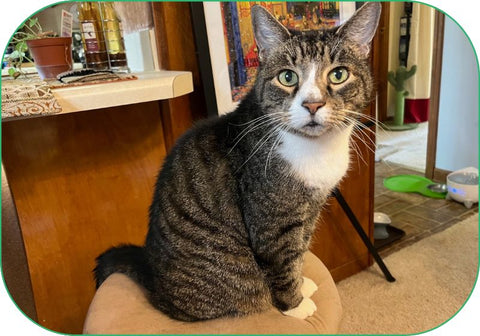
If you look at the cat supplement market, you’ll find a lot that contains l-lysine. So how do you know which one to choose?
Choosing the Best Lysine for Your Cat
If you’ve searched for a cat vitamin supplement, you may have been overwhelmed with the choices available to you. How do you know if you’re getting the high-quality supplement your cat deserves?
If you look at the back of a pet supplements bottle, you’re likely to see the active ingredients listed. But the inactive ingredients, the ones that hold those active vitamins and minerals together? Not likely.
That’s because a lot of supplement manufacturers don’t want you to know that many binders and fillers aren’t really “inactive” but can be actively harmful. Look for a supplement that discloses inactive ingredients and promises no harmful binders or fillers.
Also search for supplements that get their vitamins and minerals from whole food and natural sources. “Cold-pressed” is another great term to look for, since it means heat hasn’t destroyed those beneficial nutrients.

Unlike human supplements, pet supplements aren’t required to meet strict manufacturing requirements. That’s why it’s vital to find a company you can trust. Look for full disclosures about their manufacturing process and what goes into their supplements.
For example, we’ve never hidden what goes into our cat supplements or how they’re made - because we don’t have to. Our ingredients are sourced and procured from pre-qualified manufacturers and distributors located in the United States. Our facilities are USDA-inspected & third-party audited based on 21 CFR Part 117 – CGMP Practice, Hazard Analysis, & Risk-Based Preventive Controls for Human Food.
When you get your cat’s lysine from us, you can rest assured you’re getting the highest quality supplement you can. And you can also be sure you’re doing the right thing to support your cat’s immune system for years to come.
The Tail End
We all want to give our cats the best life possible. By supporting their immune system through things like regular vet visits, healthy exercise, balanced meals, high-quality nutritional supplements, and immune-supporting nutrients like lysine, we can provide the tools they need to live long, healthy lives.


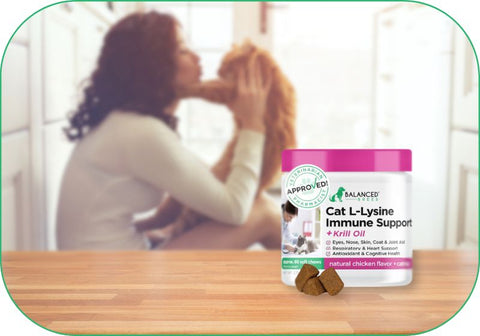
Leave a comment